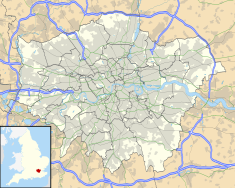Debenham House
| Debenham House | |
|---|---|

Debenham House, 2015
|
|
| Location | Holland Park, West London, England |
| Coordinates | 51°30′8.94″N 0°12′31.82″W / 51.5024833°N 0.2088389°WCoordinates: 51°30′8.94″N 0°12′31.82″W / 51.5024833°N 0.2088389°W |
| Built | 1905–07 |
| Architect | Halsey Ricardo |
| Architectural style(s) | Arts and Crafts |
| Governing body | Privately owned |
|
Listed Building – Grade I
|
|
| Official name: Debenham House | |
| Designated | 15 April 1969 |
| Reference no. | 1080783 |
Debenham House (or Peacock House) at 8 Addison Road is a large detached house in the Holland Park district of Kensington and Chelsea, W14. Built in the Arts and Crafts style by the architect Halsey Ricardo, it is a Grade I listed building.
The house was designed in 1905 for department store owner Ernest Ridley Debenham. Debenham had previously lived in another house designed by Ricrado, at 57 Melbury Road in Holland Park. The house only became known as Debenham House after it was sold on Sir Ernest's death.
The building is currently owned by Ford Motor Company through Blue Oval Holdings Limited.
The exterior of Debenham House is Italianate, while the interior style is Arts and Crafts. It is richly coloured everywhere. The main parts of exterior are clad in variegated Royal Doulton Carrara ware with inset panels faced with green and blue Burmantofts bricks. Ricardo was an advocate of ‘structural polychromy’. The glazed materials were also intended to resist the aging effects of the polluted London air. Critic Jonathan Meades has described the house as "structurally stodgy – an alderman dressed as a hippy."
The interior contains tiles designed by William De Morgan, a mosaic dome painted by Gaetano Meo and ceilings painted by Ernest Gimson.
The domed hall, the central interior feature, has a first-floor gallery connecting the upstairs rooms. Decoration throughout the house is extraordinarily lavish. Mosaics depict members of the Debenham family as well as subjects from classical mythology. There are marble and tile fireplaces, stained glass designed by E. S. Prior and mahogany bookcases with Art Nouveau inlays in wood and mother of pearl. The light switches were specially designed and made by the Birmingham Guild of Handicraft.
...
Wikipedia

